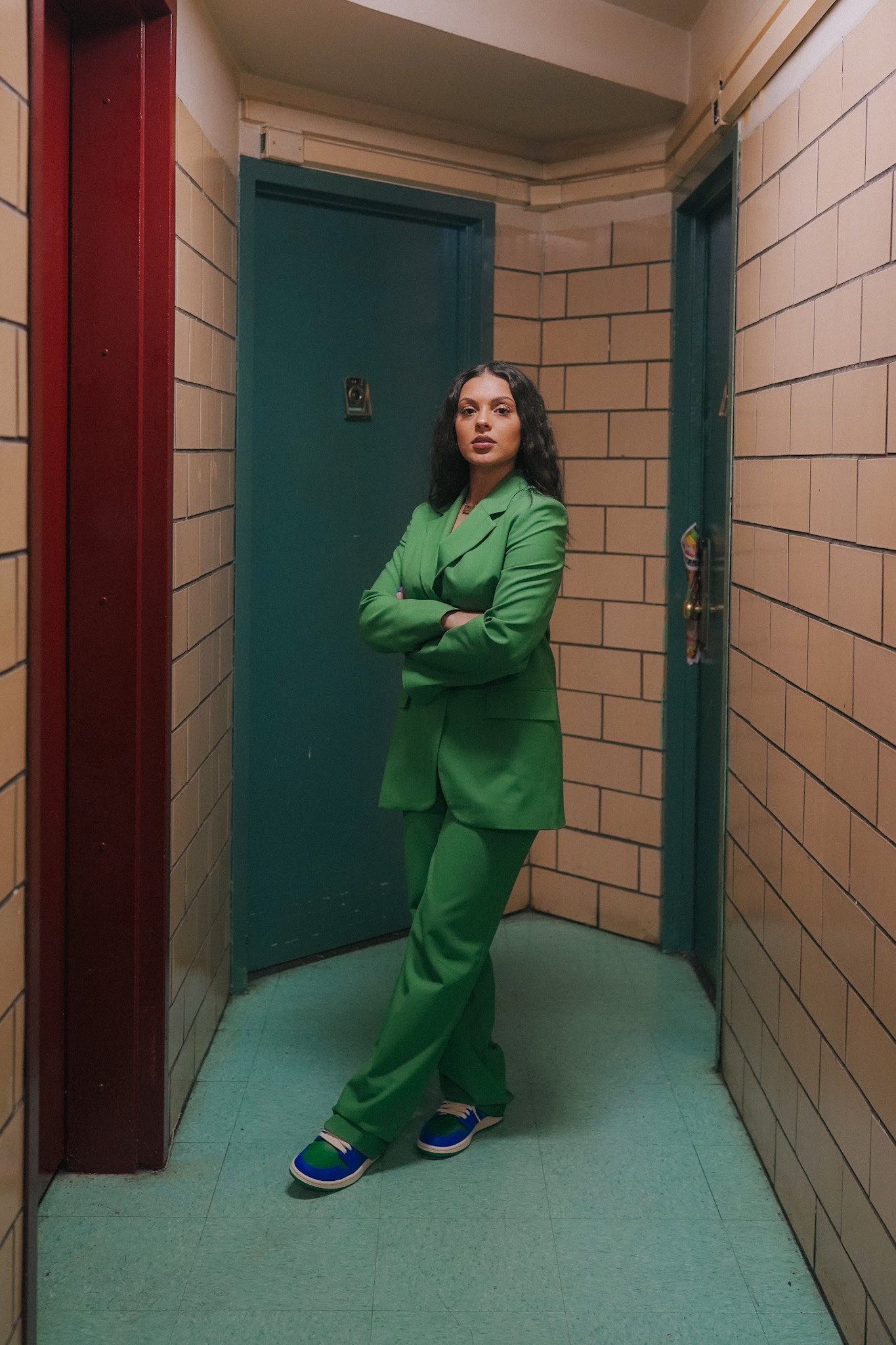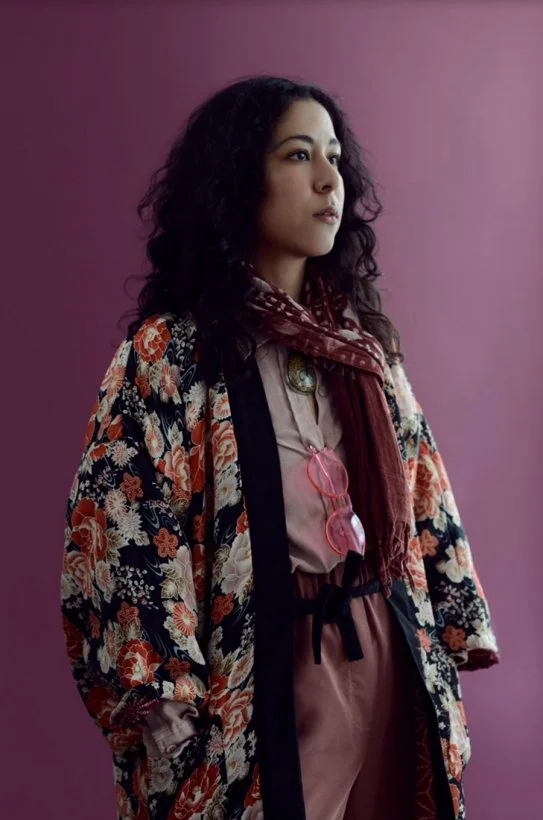Through The People: An Interview with My Projects Runway Founder Jayah Arnett
Photos of Jayah Arnett by Calvin Visuals.
Jayah Arnett (she/her), a self-described “unfiltered storyteller”, is on a mission to humanize the narrative about the New York City Housing Authority (NYCHA) community, and the damaging and unfair stereotypes its public housing residents face. Founded by Arnett in the summer of 2020, My Projects Runway (MPR) is a significant and ever-growing digital archive that thoughtfully centers Black and Brown folks thriving and surviving across NYCHA complexes. Arnett, a first-generation college grad and broadcast journalism major, shares the full and purposeful lives NYCHA dwellers are living, through genuine and moving storytelling on MPR’s Instagram. Nearly 550,000 New Yorkers reside within the 335 public housing developments within the five boroughs, meaning roughly, about 1 in every 15 New Yorkers. Through MPR, Arnett brings her lived experience as a woman of color and long term NYCHA resident, to push beyond the ingrained narratives of trauma, crime, poverty, corruption, and deplorable living conditions, that have long plagued NYCHA, and focus on stories of community care, resilience, and joy.
Arnett, 26, born to a Black Puerto Rican mother and white American father in California, has lived in East Harlem’s George Washington Carver Houses with her Afro-Latinx family since the age of 9. The loyal and determined women in Arnett’s life who’ve raised her, have shaped Arnett to become the passionate and unrelenting storyteller she’s flourished into today. She fights for the women in her family, who’ve been raised in or lived in the projects during their adult lives, and for cousins who reside in different NYCHA properties today. She’s ready to destigmatize what daily life in the projects is really like. Arnett went to high school with Eric Garner’s son, and participated in protests at school against police brutality in support of her classmate’s slain father, and the systemic ways unarmed Black people are chronically murdered by law enforcement in the U.S. Arnett’s early activism roots, so far, have positioned her to consider a law degree in the future.
Arnett created MPR as a platform for education, nostalgia, joyful narratives, New York hip-hop culture, and NYCHA history. But MPR also exists to eliminate the shame in being from and living in public housing. During her freshman year while attending a Predominantly White Institution (PWI), her alma mater SUNY Plattsburgh, a former college friend visited her home in the Carver Houses during Thanksgiving break. When Arnett returned back to campus, that ex-college friend judged her and shared with other students that, “Oh, she lives in the projects…” As a former Section 8 housing resident, raised in a Dominican immigrant single parent household in Queens, who received public benefits, I understand that type of embarrassment firsthand. During sixth grade, a classmate saw me pay for groceries in a bodega with food stamps (when they used to be colored bills that resembled Monopoly money) and I was clowned by my classmates the next day for being on welfare.
MPR’s digital archive shares how multi-dimensional and impactful NYCHA’s history has been over the decades. Hip-hop icons who’ve come from the projects, the origins of streetwear, endless Black creativity, LGBTQ+ residents who feel comfortable in their skin, respected elders of NYCHA who deserve care, Boricua pride, archival images of Black New York from decades ago, and more. Her burgeoning platform, MPR, has already partnered with art institutions like Abrons Arts Center and Photoville on vital photo projects spotlighting Black women and WOC local leaders from the Lower East Side’s public housing projects, and currently, she is collaborating with the National Public Housing Museum to expand digital storytelling about public housing beyond NYCHA on a national level. Arnett is a bold truth teller who is shattering long held toxic tropes about the NYCHA community, and who, I can feel, has a lot more to say.
What is your New York story? Can you talk about being raised in a Black Latinx family in the NYCHA community?
My great-grandma migrated from Trujillo Alto, Puerto Rico in the 1950's. My family's New York story begins with her and her apartment in Washington Houses. She raised her kids, grandkids, and watched over her great-grandkids in that house that she still lives in. My roots are heavily rooted in Spanish Harlem, being raised in a Black Latinx family in NYCHA has taught me how to be resilient no matter how the world views you.
My Projects Runway started in 2020 when you took photos of yourself during quarantine in the hallways of your NYCHA property, to show that public housing residents can thrive despite setbacks. Can you talk about how MPR destigmatizes stereotypes about housing projects across the five boroughs?
MPR is a platform that destigmatizes stereotypes about NYCHA across the five boroughs because it provides residents with a space to share their story. It humanizes their experiences and allows the outside world to understand that we are people too. We have goals and dreams too that are often overlooked because of the stereotypes. I think about how hard I had to fight for a place in this world and I want others to know I see where they are and I want their stories to matter.
MPR is such a powerful and thoughtful archive project that humanizes the mostly Black and Brown residents of the NYCHA community. Can you talk about the care, softness, and empathy you insert in your archiving practice?
When speaking to residents I look at them and I see myself. It is easy to care, have softness, and empathize with them because I am them. No matter the degree or job title I can never look past the communities that made me who I am. When archiving I always make sure to listen and remind them of how rich they are in memories and experiences others could never understand.
In 2021 you partnered with Photoville and Abrons Arts Center for the ‘Community Matriarchs of NYCHA’ project, an empowering photo series & short film that celebrated Black and Brown women residents and local leaders across several LES public housing projects. Can you talk about this significance?
This has been one of my favorite projects. I connected with each woman and got to have personal conversations with them that were fun, emotional, and empowering. This was significant for me because I love being a woman from New York and highlighting women who are powered by the people will always fuel my creativity.
“My roots are heavily rooted in Spanish Harlem, being raised in a Black Latinx family in NYCHA has taught me how to be resilient no matter how the world views you.”
You recently partnered with the National Public Housing Museum (NPHM) for an online interactive story collection project called Through the People. This feels more amplified since it’ll include stories from NYCHA, Chicago Housing Authority, and public housing residents from other states. What does it mean for you to work on a bigger scale?
It means a lot to me because I would love to learn everyone's public housing story. The good, bad, and the ugly because it’s worth listening to. This project has a lot of power in it being that it's literally being fueled "Through The People." I hope that by the end of this partnership we’ve collected stories from everywhere.
You work as a creative full-time, whether in your day job at Nike, and with your ever-expanding MPR archive project. What are special and sacred things you do to rest?
Someone asked me this the other day, and for full transparency I’m still trying to find ways to rest. I love everything I do and often forget to rest. What I like to do to rest my mind is walk through my community, turn my phone off, and binge watch some TV.
On the Aspiring Latinx podcast you commented about being opposed to people who “use the projects as a photo aesthetic.” Housing projects are a mecca for hip-hop culture, Black style, and Black aesthetics, which then gets appropriated into mainstream pop culture. Can you expand on this, and the rampant gentrification and whitewashing of streetwear?
This honestly is one of my biggest pet peeves. I saw that there are tours going on in Brooklyn where they stop at the Marcy Houses and take pictures. I think this takes away from the experiences people are living. Some people can't get things inside of their homes fixed but it’s being used as a photo-op for people who don't live or come from the culture. I think the rampant gentrification and whitewashing of streetwear allows people to think this is okay and I will always remind them it isn't.
“I think about how hard I had to fight for a place in this world and I want others to know I see where they are and I want their stories to matter.”
What’s next for MPR in 2022 and beyond?
I would love to expand MPR and travel to different states to get the stories of residents around the world firsthand. There will be some more exhibitions and hopefully a book in the near future.
This interview originally appeared on The Latinx Project’s Intervenxions in March 2022.







